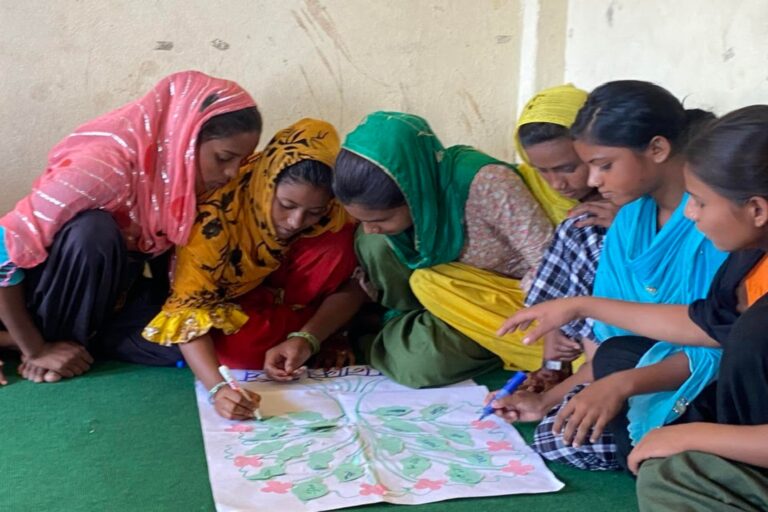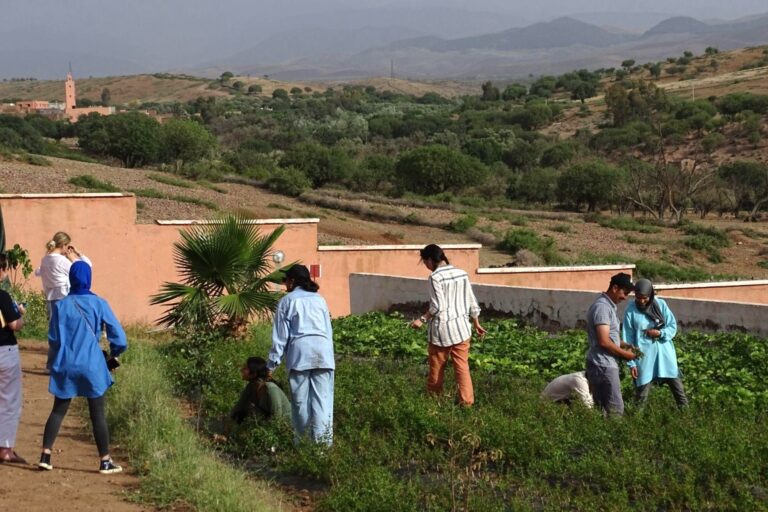Yossef Ben-Meir, Ph.D., is a sociologist and the president of the High Atlas Foundation, a nonprofit organization dedicated to sustainable development in Morocco.
In terms of human development potential, Morocco is a nation of immense promise, where gifted fortunes of nature such as wide-ranging organic agricultural products come together with dynamic social development frameworks. Moroccan development opportunities could launch the country into a haven for community-managed projects and change in Africa and the Near East.
The Moroccan Frameworks aim to structurally guide local and national growth. Achievement of Morocco’s development potential depends most crucially on the following three:
- The Municipal Charter, amended in 2010, requires the creation of multi-year community development plans that are formed by public participation;
- The National Initiative for Human Development, launched in 2005, aims to provide access to sub-nationally managed funding for multidimensional development projects; and
- The Decentralization Roadmap, first unveiled in 2008, innovatively synthesizes three approaches – delegation, deconcentration, and devolution – to empower regions in development.
Sadly, for the majority of people, the application of the country’s combined initiatives for development is not proving fruitful.[1] The problem is that Morocco’s programs for national growth and development through public participation are not being orchestrated in concert. Integrating these programs would enable their mutual reinforcement to promote accelerated growth and success of development initiatives.
Regarding the public calls to action in Morocco by King Mohammed VI,[2] that the nation must now reconsider its development model, I submit that it is specifically the implementation of these three frameworks, among other national initiatives involving women’s and youth empowerment and agriculture, that requires a major reevaluation and overhaul.
How can these three frameworks better fulfill their individual purposes, and, more importantly, how can they intersect with each other to foster human development that is sustained by local beneficiaries?
To Morocco’s credit, there already exist key laws, policies, and programs – the Constitution itself – to promote development projects that reflect locally shared priorities and have participatory decision-making and governing arrangements. The lack of rural development is predominantly due not to lack of opportunities but to the poor implementation of the existing Frameworks, the continued pervasive poverty, and widespread gender biases. Morocco has declared positions on sustainable development that could result in successful, scaled community movements that engage and improve the lives of all society, if applied correctly.[3]
The Municipal Charter
Under the Municipal Charter, locally elected representatives are required to ensure that their constituencies participate in the creation of community development plans and the selection of projects to be implemented in their villages and neighborhoods. Further, people-driven projects, such as those instituted in the Municipal Charter, are necessary for sustainable development and the actualization of the other frameworks that compose the Moroccan model.
However, in Morocco there is a constant challenge: elected members to municipal councils are typically not trained in facilitating participatory methods. The practice of employing procedures that encourage local people to discuss their development goals and create action plans for their projects’ implementation is an essential experience for elected officials in order that they know how to actually fulfill their formal responsibilities to help advance sustainable growth.
Much of Morocco’s development success essentially depends upon: 1) dispersing the skills to create and assist inclusive community planning meetings, and 2) implementing the projects that become designed by the people, who are the project beneficiaries and managers. The Municipal Charter – which directs the administrative tier closest to the people – establishes an avenue for the success of participatory development.
Catalyzing widespread, inclusive development projects means first implementing experiential training programs for university students, school teachers, technicians, civil society members, elected officials, and local people to be active agents of participatory planning and development. Sustainable development necessitates the dispersion of these facilitation skills to catalyze and help maintain local dialogue and to implement most needed projects. The training process to enhance the personal capacities of individuals from different walks of life, but who all interface with communities, enables them to help carry forward local development movements. Through training-by-doing, the aforementioned municipal development plans can then reflect the actual will of the people in regards to the projects and future they most want.
Without local representatives knowing how to implement people’s participation in development, and without the local people aware of this vital right, plans are typically fashioned in a top-down manner with impossible or unrealistic levels of uniformity. It has come to the point where the statutory requirement to create community plans through genuine participatory processes is now seeming rhetorical. Skill-building in facilitating local consensus, as well as gender- and youth-based dialogue to understand the different needs among the different demographic groups, are absolutely critical if these dimensions of the Municipal Charter will be effectively delivered.
The National Initiative for Human Development
The second Framework, Morocco’s National Initiative for Human Development (NIHD), is a national fund for infrastructure projects, capacity-building, social and cultural revitalization, and job-generating activities on the sub-national level. Its budget through 2023 was approved in September 2018 at the $1.9 billion level.[4]
In theory, the NIHD should primarily help to actualize the development projects designed under the Municipal Charter. Indeed, the NIHD and the Municipal Charter can only be successful if they work in tandem. NIHD should help fund the participatory development plans embodied in the Charter, and finance the projects that local people expressed they most need and want to implement, which ensures their sustainability. If this were the case, and if the NIHD’s budget were doubled through 2023, then Morocco would see the fulfillment of its development model and vision, instead of remaining ranked 123rd among nations on the Human Development Index following an enormity of expenditure, intentions, and effort.[5]
If the Municipal Charter does not result into projects properly defined over the course of community-wide meetings, which is unfortunately often the case due to inadequate participatory training and finance, then it can be expected that the NIHD will not have adequate local projects to fund and whose aggregate of results falls short of national goals – which is also happening.
Other practical NIHD reforms to increase its development impact should include the following: First, the provincial administrations of NIHD should accept development proposals all year round. As of now, the shifting periods during the year they receive proposals mean that opportunities open and close and most local associations and cooperatives remain unaware.
Second, NIHD should be maximally flexible to fund the range of projects communities determine most important to them (whether in health, education, involving construction, etc.). The NIHD’s criteria regarding project types they consider supporting also often changes, while rural community priorities have remained consistent.
Third, the NIHD should double the amount (to $60,000) of the funding ceiling for local projects; and reduce to 10 percent (currently at 30 percent, a prohibitive barrier) the requirement that recipients contribute toward the financial amount requested. The NIHD should accept in-kind giving on the part of community applicants, such as labor and land, in place of the financial contribution.
Finally, and critically, the NIHD should co-create project proposals among its staff with the prospective local beneficiaries. The majority of rural people are illiterate and cannot draft the required documents, making it so that communities who could utilize NIHD most are not accessing it. Credit Agricole in Morocco and USAID in northern Iraq are starting to gain experience co-creating project proposals with community representatives and beneficiaries, lessons from which might be helpful if NIHD adopted this approach. Incorporating these measures and aligning NIHD and the Municipal Charter regarding participatory planning and development could create a sharp rise in the implementation of new local development projects that are consistent with the necessities of sustainability.
The Decentralization Roadmap
Third, the “Roadmap” of Moroccan decentralization – derived from a series of public statements of the King of Morocco since 2008 – aims to utilize ongoing national government engagement (devolution) along with sub-national partnerships (deconcentration), to help implement community projects (delegation).[6] In other words, the Moroccan pathway aims to rally national resources and partnerships for local development, which in principle is good for the sake of sustainability.
However, appropriate and lasting construction must happen in tandem with the implementation of community planning, projects, and partnership-building between the public, private, and civil sectors.[7] Relationships and joint development actions are what actually constitute decentralized systems; this requires sustained community initiatives on a widespread basis. Therefore, without the Municipal Charter and the NIHD working together, adequate decentralized arrangements of public administrations will not be formed to the same extent, nor will they endure.
Overall, decentralization is not significantly taking hold in Morocco, which further adds to the suppression of new local development. The national level government still generally decides the parameters, terms, cases, and situations for sub-regional actions. However, there is reason to hope that there will be progress: the King of Morocco tasked the government to submit in October 2018 a draft Decentralization Charter, which would ideally bind national and regional government agencies to specific functions for the administration of human services.[8]
There are concerns that the process of decentralization in pursuing development may lead to destabilizing political outcomes.[9] With regards to the Moroccan case, the emphasis on participatory approaches by local communities in creating these projects centers on their livelihoods and meeting their immediate human needs. During the course of 25 years of working in community development in Morocco, having directly or indirectly helped bring about local meetings and projects in all of its 12 regions, I have observed no basis for concerns that stem beyond these developmental factors involving the unrealized plethora of socioeconomic and environmental opportunities of the people.
Communities are focused on their needs and projects to meet them, on creating and furthering their associations and cooperatives toward their goals, and on somehow addressing what can seem stifling difficulties facing progress. There certainly has been ample opportunity to redress the needless poverty, and there still is, if only Moroccan leadership were to fulfill the model of decentralized participatory development to which it is committed.
Understandably, achieving decentralization, particularly in regards to the pace in which it is executed, is a delicate process. The local level is stratified socio-economically, environmentally, and by gender, just as it is on the national and global levels.[10] Advancing decentralization quickly can be fraught with unhelpful consequences, such as further entrenchment of locally affluent and political classes. However, genuine implementation of the Municipal Charter in close conjunction with the NIHD could create the necessary participatory democratic conditions which would enable Morocco to eventually opt for an emerging form of communalization, or decentralized management of development planning and projects to the municipal level.
These three Moroccan Frameworks for Development contain what is needed in order for development to be catalyzed with enduring and sustainable results for marginalized areas and groups in the country. The Municipal Charter could provide the plans for projects that the NIHD may then help accomplish. Decentralized procedures and management systems are consequently built alongside the local communities’ project implementation, involving multi-sectoral partnerships dedicated to achieving goals that are defined at sub-national levels.
They underscore participatory approaches for defining most important initiatives. They encourage decentralization in order to enable local communities and civil and public agencies to make decisions and allocate resources for people’s projects. The Frameworks target women and youth in recognition of their disadvantaged situations and their roles as key drivers of sustainable change. Within each Framework’s own domain and taken together, they are comprehensive and provide the needed pathways for the people of Morocco to consider the future they want, while providing a course and means to help achieve their human development goals.
It is not the insufficiency of these frameworks that accounts for the hardships that afflict Moroccan people, especially in rural areas. Rather, it is their inadequate implementation, stemming from a considerable lack of understanding among elected and ministerial officials and local leaders, as well as a lack of the skills needed to translate them into reality. This is all that is needed for men and women of all ages to come together for community workshops, which, if followed through, can ultimately deliver the projects that they and their families have sought for far too long.
Footnotes
[1] Noury, Ahmed Idrissi. “Lifting Moroccans out of Poverty,” Fair Observer, 5 April 2017. https://www.fairobserver.com/world-news/poverty-morocco-world-news-sustainable-development-34540.
[2] Koundouno, Tamba Francois. “King Mohammed VI Calls for New Development Model, Accountable Service Service,” Morocco World News, 27 February 2018.
[3] Ben-Meir, Yossef. “Human Development in the Arab Spring: The Implications of Decentralization in the Context of Human Development, Foreign Policy Journal, 26 June 2015.
[4] The North Africa Post. “King Mohammed VI Launches 3rd Phase of the National Initiative for Human Development,” 20 September 2018. http://northafricapost.com/25489-king-mohammed-vi-launches-3rd-phase-of-national-initiative-for-human-development.html.
[5] UNDP, “Human Development Indices and Indicators: 2018 Statistical Update: Morocco,” 2018. http://hdr.undp.org/sites/all/themes/hdr_theme/country-notes/MAR.pdf.
[6] King Mohammed VI. “Full text of the King’s Speech on the Occasion of the 33rd Anniversary of the Green March,” Maghrib Arab Press, 6 November 2008; King Mohammed VI. “Full text of King Mohammed VI Speech on 9th Anniversary of Throne Day,” 30 July 2008; King Mohammed VI. “Full text of King Mohammed VI’s Speech on the 55th Anniversary of the Revolution of the King and the People,” 20 August 2008; King Mohammed VI. “Full Speech of King Mohammed VI at Opening of Parliament Fall Session”, 10 October 2008; King Mohammed VI. “Full Text of the King’s Speech on the 10th Anniversary of Throne Day”, 30 July 2009; King Mohammed VI. “Full Text of the King’s Speech on Occasion of 34th Anniversary of the Green March,” 6 November 2009; King Mohammed VI. “Full Text of the King’s Speech on 56th Anniversary of the Revolution of the King and the People,” 20 August 2009; and King Mohammed VI. “The King addresses a speech to the nation,” 3 January 2010.
[7] Friedmann, John. “Planning as Social Learning,” in Korten, D. and Klauss, R. (eds.) People Centered Development: Contributions toward Theory and Planning Frameworks, West Hartford, CT: Kumarian Press, pp. 189-94, 1984:194.
[8] Reuters. “King Mohammed VI Urges Action to Address Morocco’s Social Problems,” 30 July 2018. https://www.reuters.com/article/us-morocco-politics/king-mohammed-vi-urges-action-to-address-moroccos-social-problems-idUSKBN1KJ0Q9.
[9] Rolly, Horst Friedrich. Participatory Planning of Sustainable Development Projects, Frankfurt Am Main, Germany: Peter Lang, 2001:56.
[10] Brohman, John. (1996) Popular Development: Rethinking the Theory and Practice of Development, Oxford: Blackwell, 1996:235.



